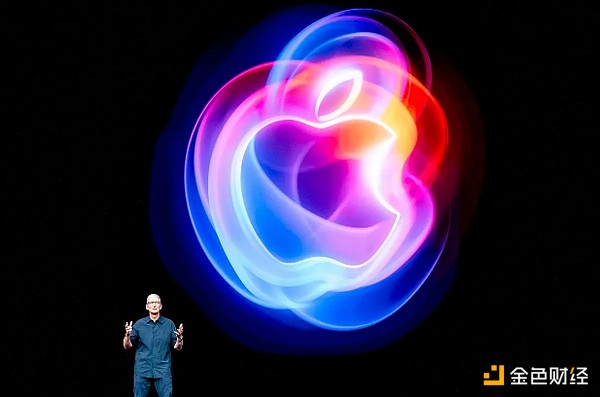By Mark Gurman, Bloomberg; Translated by Tao Zhu, Golden Finance
Apple Inc. unveiled the latest version of its flagship device, the iPhone 16, betting it can woo consumers with a modest hardware upgrade and yet-to-be-released artificial intelligence technology.
CEO Tim Cook unveiled the smartphone along with a new watch and AirPods headphones at an event on Monday filled with promises of artificial intelligence. He said the iPhone 16 was built “from the ground up” for artificial intelligence, though the features will only be added gradually to the device through software updates.
It’s a gambit for Apple, which has been racing to develop a suite of tools called Apple Intelligence. The software won’t be included in the initial version of the new iPhone, even though Apple has been touting the technology since its developer conference in June. The new iPhones go on sale Friday, with the products hitting stores on Sept. 20.
“This is just the beginning,” Apple software chief Craig Federighi said during the presentation. He said the first set of tools will be released as part of beta testing in October, and “more features will be coming in the coming months.”
As part of the event, Apple unveiled a smartwatch with a larger screen and the ability to detect sleep apnea. The company also unveiled new software that turns AirPods into hearing aids.
The debut of the iPhone was the highlight of the event, but the company made relatively minor changes to the appearance and hardware features of the devices.The iPhone 16 and 16 Plus will be available in new colors and feature customizable action buttons that are only available on the higher-end models. There are also more powerful chips and new camera control buttons that allow users to take pictures and access camera features.
Meanwhile, the new Pro models will feature slightly larger displays and thinner bezels. They’ll run A18 Pro processors and an upgraded neural engine — the part of the chip that handles AI tasks. The phones have more powerful camera components and video capabilities, allowing them to take higher-resolution photos and more cinematic slow-motion clips.
Apple is playing catch-up in the field of artificial intelligence, where tech peers such as Alphabet Inc.’s Google and Microsoft have made great strides. Monday’s presentation was partly a pitch to consumers and Wall Street that Apple should be taken seriously in the field.
But it’s still early days for the Cupertino, California-based company’s AI technology. Apple Intelligence tools have faced multiple delays, with many key features not coming until next year. For now, the technology is focused on summarizing messages and notifications, rather than matching the stunning capabilities of rival systems.

Apple CEO Tim Cook during the company's new iPhone, AirPods and Watch. Photographer: David Paul Morris/Bloomberg
During the event, Apple's stock price fell more than 1.5%, but later rebounded. This lackluster reaction is quite common at Apple's events. Most new features are announced in advance, and there were few surprises at the event on Monday.
Artificial intelligence was a major theme at the event, which kicked off at 10 a.m. local time. The company hopes to use Apple Intelligence software to entice consumers to buy upgraded devices, as customers will need a new iPhone to handle these features.
Apple Intelligence will include an upgraded Siri digital assistant and the ability to create custom emojis using text prompts. The event’s “It’s Glowtime” theme is a reference to the look of Siri’s new interface.
But much of the technology won’t be ready right away, which could limit its impact on iPhone sales. Even if Apple Intelligence debuts in October, it will be a beta tester — an early version aimed at more adventurous consumers.
This “suggests that many features are still being fine-tuned for release and are not yet ready for prime time,” eMarketer analyst Gadjo Sevilla said in a note. “Security and privacy concerns may be the reason for the feature delay.”
The entry-level iPhone still starts at $799, with the Plus model costing $899. The iPhone 16 Pro will cost $999, while the larger Pro Max version will cost $1,199.
Apple Watch
The new Apple Watch, the Series 10 version, has a 30% larger screen and a thinner design. The company said the sleep apnea feature will be available in more than 150 regions.
The new watch is about 10% thinner than the Series 9 version. It also features a new titanium chassis that's lighter than the aluminum model. The device starts at $399 and will be released on September 20. A new version of the high-end Ultra model was also released that day, priced at $799.
The launch included an updated version of the standard $129 AirPods, which shrinks the case size and adds a USB-C charger. There will also be a mid-range $179 product with noise cancellation. This feature was previously only available on the high-end AirPods Pro.
The company introduced a new $549 line of AirPods Max headphones, which come in bright colors and also have a USB-C charging port. Like the rest of the products, the devices will be released on September 20. Apple did not launch a new version of the AirPods Pro, but it did introduce features such as a hearing test and the ability to act as a hearing aid. Those features will be available in the form of a software update this fall.
Event Timing
The iPhone's debut is typically Apple's most important launch of the year. The device accounts for about half of the company's annual revenue, and it helps drive additional sales in the form of accessories and services.
Apple doesn't typically unveil the iPhone on Mondays, but the early launch allows the company to avoid an eventful Tuesday: The U.S. presidential debate is scheduled for that day, and the European Commission is expected to rule on whether Apple must pay $14 billion in taxes.
 JinseFinance
JinseFinance









